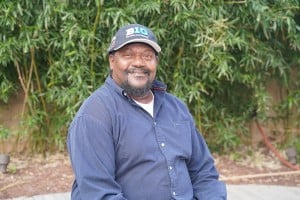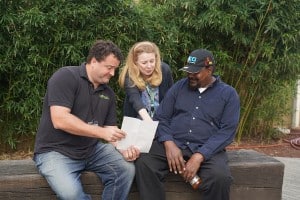When Ronnie Riley first connected with our ONE Health complex care program, he was a “broken man,” struggling with homelessness, mental health concerns, and addiction.
ONE Health works intensively with patients to provide both medical care and support for social determinants of health.
Now, thanks to the ONE Health team and their strong partnership with Alliance Healthcare Services, Ronnie is regaining his health and his sense of hope and purpose.
Ronnie Riley just needed someone to give him a chance.
As a child, he moved around a lot as his mom tried to escape abuse. His father gave him his first taste of alcohol at age 6; his mom gave him marijuana when he was 8.
As an adult, he struggled with addiction, undiagnosed mental illness and homelessness. He begged for food or ate from a dumpster, and street gangs stole his shoes and coat. Tragically, his wife was shot to death in front of him.
When Cristina Wilson, case manager with the ONE Health complex care program, met Ronnie, she had to look behind his exterior to see a man who wanted a chance at a better life.
“He was a broken man, homeless, and depressed. He struggled with suicidal ideation to make the pain go away,” she said. “But underneath all of life’s disappointments and hurt was a very nice man who is concerned for others. He is a ‘gentle giant’ with a huge heart, and he has dreams that he hopes to fulfill one day.”
ONE Health serves uninsured patients who have frequent emergency visits and inpatient hospital stays. Social workers and nurses helps patients access medical care at Regional One Health and work with community partners on social determinants of health including mental health, housing, food and transportation.
Ronnie’s ONE Health journey started after he found his way to a local nonprofit. He had been sleeping in an abandoned building on Elvis Presley Boulevard, and the nonprofit offered the help they could: “They gave me a quilt, it was white with gold trim, and blankets. My feet had holes in them, and they washed them,” Ronnie remembers.
But it soon became clear he needed more, and staff contacted ONE Health. “He has serious life-threatening health issues including seizures, diabetes, hypertension, GERD, and blood clots in his lungs and legs,” Cristina explained. “The winters were so cold that he had developed frostbite and lost some of his toes. He needed services they weren’t able to provide.”

After working with the ONE Health team, Ronnie Riley is once again planning for the future.“God has blessed me right and left. I’m off the streets; I have a roof over my head in a peaceful neighborhood,” Ronnie said. “I feel better about myself. My pastor tells me there’s something better for me, and God has a purpose for my life.”
Ronnie was also living with alcoholism and undiagnosed schizophrenic bipolar disorder, so once Ronnie was connected with ONE Health, Cristina brought in Alliance Healthcare Services to provide mental health services. Alliance is a key ONE Health partner, and the two teams hold monthly meetings and are in daily contact about the patients they serve.
Ty Davis is clinical supervisor for Alliance’s ACT program, which brings mental health services to at-risk patients directly and intensively.
“There’s a saying in therapy that you meet your clients where they are. In our case, that is quite literal,” Ty said. “If they’re housed, we go to their home. If they’re unhoused, we go to the mission or wherever they’re sleeping. I’ve done therapy during a client’s break at work. I’ve done therapy under the bridge on Brooks Road. I do a lot of ‘dashboard therapy,’ where I put them in my car and we drive around and we just talk.”
Ty and Ronnie laugh when they think of their shaky start to dashboard therapy. “I thought he was the police!” Ronnie said. “I said, ‘What did I do?’”
While Ty worked to earn Ronnie’s trust so he could open up about past trauma, Cristina worked on stabilizing his physical health. Early on, she mostly saw him after a crisis.
“When he ran out of medications, he would be found unconscious on the streets after having a seizure or in a diabetic coma, and he would be brought here by ambulance,” she said. “We established care with a primary care provider, and he started to see an endocrinologist, podiatrist, clinical pharmacist and neurologist. He also needed physical therapy and occupational therapy.”
Slowly but surely, a different Ronnie started to emerge.
“It took many months to build a foundation of trust,” Cristina said. “It had been a long time since he had someone he could trust and rely on to help him.”
Ty said that process is key to a patient’s success. “We try to remove as many barriers as we can,” he said. “It’s tough to talk about childhood trauma when you don’t know where you’re going to sleep. If we check those boxes first, it builds a rapport.”

Ty Davis from Alliance Healthcare Services and ONE Health Case Manager Cristina Wilson work closely with Ronnie. “Thanks to his health care team and partners, he’s able to have a vision. He can enjoy his life and plan for tomorrow,” Cristina said. “Tomorrow is no longer a vision of despair and hopelessness – rather, it’s one of hope and happiness.”
For Ronnie, it felt like one last chance to turn his life around. “I don’t like my past. I would steal beer from trucks or from Kroger. I was in a gang,” he said. “I knew that wasn’t the life I wanted. I felt like, ‘I’ve gotta get it right this time.’”
As Ronnie’s health stabilized, Alliance secured a spot for him at a boardinghouse, giving him safe shelter and three nutritious meals a day. It has, quite literally, been a lifesaver.
One day, when Ronnie did not come down for breakfast, boardinghouse staff him unresponsive in his room. He was taken to a nearby hospital by ambulance, and staff notified ONE Health and Alliance so they could work with doctors there to monitor Ronnie’s condition and arrange his follow-up care at Regional One Health.
“This type of teamwork and collaboration is unparalleled in health care,” Cristina said.
It allows Ronnie to keep improving his health, and to rebuild his sense of hope and purpose. “I thank God for having these people on my side,” Ronnie said. “They say they’d never turn their back on me, and I believe them. They’re always there for me.”
And he’s there for himself, too: “Ronnie gave us his word: he would do everything he needed to get back on track. Since then, he has not wavered,” Ty said. “Ronnie is successful because of his own motivation and participation.”
Today, Ronnie has been alcohol-free for over three years. He talks to his mom and dad without bitterness. He’s building a strong relationship with his daughter. He has gone back to church.
“God has blessed me right and left. I’m off the streets; I have a roof over my head in a peaceful neighborhood,” Ronnie said. “I feel better about myself. My pastor tells me there’s something better for me, and God has a purpose for my life.”
That purpose could be to write a book, or use his cooking skills to open a food truck or restaurant that he could leave to his daughter.
For Ronnie, simply having a chance to dream is a victory.
“Thanks to his health care team and partners, he’s able to have a vision. He can enjoy his life and plan for tomorrow,” Cristina said. “Tomorrow is no longer a vision of despair and hopelessness – rather, it’s one of hope and happiness.”

